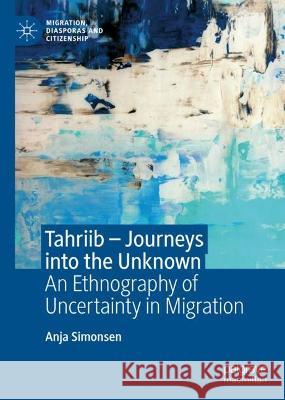Tahriib – Journeys into the Unknown: An Ethnography of Uncertainty in Migration » książka
Tahriib – Journeys into the Unknown: An Ethnography of Uncertainty in Migration
ISBN-13: 9783031278204 / Angielski
Tahriib – Journeys into the Unknown: An Ethnography of Uncertainty in Migration
ISBN-13: 9783031278204 / Angielski
(netto: 485,06 VAT: 5%)
Najniższa cena z 30 dni: 501,19 zł
ok. 20 dni roboczych.
Darmowa dostawa!
This book offers an innovative approach to migration by exploring Somali youths’tahriib, their ‘journey into the unknown’. When young Somali men and women refer to the ‘unknown’, they recognize the uncertainty of their journeys. This uncertainty is partly due to the laws and policies that restrict the right to cross national boundaries and define their movements as illegal. Based on fieldwork conducted with Somali youth, mainly from Somaliland, the book details their perceptions of the journey and their practices on the way. The author shows how they position themselves in a constantly changing world before and during the so-called migration crisis that began in 2015. A vital part oftahriibis the constant search for information on possible routes ahead, a search that intensifies as the journey progresses. Specific policy responses, such as biometric registration, influence practices of gathering and sharing information. They have implications for the creation and shattering of hope and the experience of time en route. The book demonstrates thattahriibis ultimately about spending one’s time wisely and about creating and maintaining hope in what may seem hopeless situations.
This book offers an innovative approach to migration by exploring Somali youths’ tahriib, their ‘journey into the unknown’. When young Somali men and women refer to the ‘unknown’, they recognize the uncertainty of their journeys. This uncertainty is partly due to the laws and policies that restrict the right to cross national boundaries and define their movements as illegal. Based on fieldwork conducted with Somali youth, mainly from Somaliland, the book details their perceptions of the journey and their practices on the way. The author shows how they position themselves in a constantly changing world before and during the so-called migration crisis that began in 2015. A vital part of tahriib is the constant search for information on possible routes ahead, a search that intensifies as the journey progresses. Specific policy responses, such as biometric registration, influence practices of gathering and sharing information. They have implications for the creation and shattering of hope and the experience of time en route. The book demonstrates that tahriib is ultimately about spending one’s time wisely and about creating and maintaining hope in what may seem hopeless situations.











